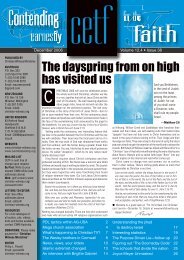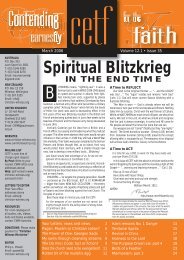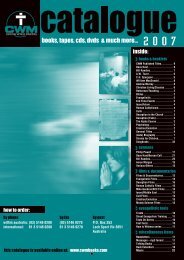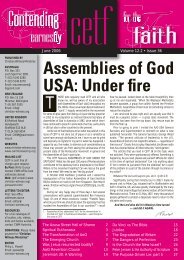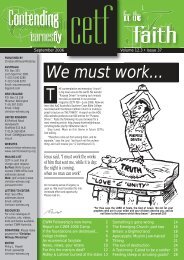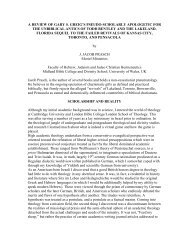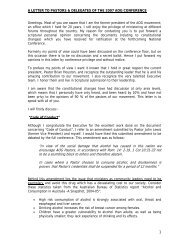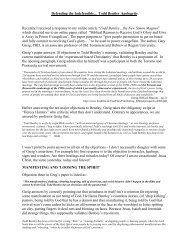PDF here... - Christian-witness.org
PDF here... - Christian-witness.org
PDF here... - Christian-witness.org
- No tags were found...
You also want an ePaper? Increase the reach of your titles
YUMPU automatically turns print PDFs into web optimized ePapers that Google loves.
T H E N W H E N L U S T H A S C O N C E I V E D I T B R I N G S F O R T H S I N • J a m e s 1 : 1 5Is t<strong>here</strong> victory over sinBy MARK MULLINSIN Matthew 5:48 the Lord Jesus gavethis command to the crowds gat<strong>here</strong>dtogether to hear His sermon on themount: “Be perfect even as your Fatherin heaven is perfect.” The Greek wordused by the Lord is “teleios” which means to becomplete and includes moral character. The contextof this exhortation to holiness comes as Christapplies the outward commands of the law to theinner man, so that we are told that to be angrywithout cause against our brother is tantamountto murder (v22), and to lust after a person of theopposite sex is to commit adultery in our hearts(v28). How do we fare under this exacting test,brother and sister in Christ?In Romans 6 Paul begins the chapter with thiswell-known rhetorical question: “What shall wesay then? Shall we continue in sin, that grace mayabound?” And look at this surprising answer in verse2: “May it never be!. How shall we, that are deadto sin, live in it any longer?” Paul explains that wehave been crucified with Christ and that the old selfis now dead. In verse 7 he goes on to say that Hewho is dead has ceased from sin! I remember thatwhen I was baptized I felt as if I had gone to mygrave and indeed Paul tells us that this is exactlywhat happens to the <strong>Christian</strong> when he turns toChrist (v4): “T<strong>here</strong>fore we are buried with him bybaptism into death: that as Christ was raised upfrom the dead by the glory of the Father, so we alsoshould walk in newness of life.”In verse 11 Paul goes on to tell us to reckonourselves dead to sin: that is to act as if we aredead to sin. It would make no sense to suggestthat this act of reckoning was wholly futile; like theemperor without his clothes on, whom everyone toldlooked wonderful except the innocent little boy whotold him the truth. When we reckon ourselves deadto sin we are to reckon ourselves alive to God. Ifbeing born again means anything doesn’t it meanjust that? As Paul writes (in Ephesians 2:5) we havebeen made alive in Christ!T<strong>here</strong> are many who claim that we can neverhave victory over sin in this life and t<strong>here</strong>fore thatwe shouldn’t expect to. Now I am far from perfect,regrettably. However I cannot accept that the LordJesus would make a demand on his followers thatthey are unable to meet. Many cite Paul’s accountof his battle against sin in Romans 7 as clear andirrefutable evidence that he did not have victoryover sin in this life. Well, let’s have a look at thispassage.Chapter 7 opens with Paul’s illustration thatthose in Christ have been set free from the lawjust as a widow is set free to remarry after herhusband dies (see verses 1-6). This leads on to Pauladdressing the great objection that is raised by thelaw’s barrier to us having life: is the law evil (v7)?18He then explains that the purpose of the law is todemonstrate our sin because it is only when wehave a law that we are able to see that we havebroken it: sin is seen as sin when compared to thelaw (v9). He retorts that it is we who are sinnersand not the law.In verse 12 Paul concludes that the law and thecommandment are holy, just and good. In verse13 he continues his defence of the law showingconclusively that the law’s purpose is to demonstratehow sinful sin is. For us to understand Paul’s logicin the rest of chapter 7 we must start at verse 13which provides us our gateway into all that follows.The Crucial Importanceof the Word “for”The first “for” in verse 14 defends the law on theground that we know that the law is spiritual butI am carnal, sold under sin. Paul is saying thatthe law cannot be at fault because it is holy. I amthe one who is fleshly and sold under sin. He isobviously not talking about the redeemed statebut the unredeemed. In order to bring me to ChristI have to know my sin. My sin is made known to meby the law which, we know from Galatians 3:24, isour guardian that leads us to Christ.In order to further establish this point Paul usesthe second “for” to show that it is sin in me thatis the cause of the problem and not the law. The“I” is the old nature. It illustrates the battle thatoccurs between an awakening mind and a sinfulbody. T<strong>here</strong> is a part of me that knows what is rightbut another part that cannot do what is right. Fromthis in verse 16 Paul deduces that if I know whatis right, and I acknowledge that what I am doing isnot right, then I consent that the law is good: againhe is making the point that it is sin in me that is atfault and not the law.In verse 18 we have a third “for”: Paul explainswhy it is—so that my knowledge, that what I amdoing is not what I want to do, is the root of theproblem and not the law: t<strong>here</strong> is a part of me thatknows that in me (my flesh) dwells no good thingbecause, although I want to do the right thing, Iam not able to do it. He makes this point again inverse 19. I wonder how many of us have had thisexperience before we were converted? I rememberthat t<strong>here</strong> was someone I knew who alwaysseemed to do the right thing and naturally seemedto have a heart for others. Actually she was notthen a <strong>Christian</strong> although I understand she is nowconverted. However the point is that in my fallenstate I acknowledged that someone was better thanme because she walked more closely according tothe law that I consistently broke. I acknowledgedthis law that it was good but, like Paul, did not havethe power to keep it.The AwakeningConscienceFrom verse 17 onwards Paul seems to be excusinghimself from his sin. Does this mean that Paulis suggesting that, in some way, a person whocannot do anything about his sin is excused fromits consequences? This cannot be so because hehas just concluded at the end of chapter 6 thatthe wages of sin is death and indeed he concludeschapter 7 with the cry in verse 24: “O wretched manthat I am! who shall deliver me from the body ofthis death?” This old nature that was dragging himto hell and separation from God needed to be dealtwith but he was powerless for the task.No, I believe that the first “I” that we see inverse 20 is referring to the mind or conscience thathas been awakened by the law and realises whatsin is and would resist the committing of the sin: itis not that part of me that sins but it is the sin thatdwells within the rest of me. Again Paul returns tohis old theme to show that the law is good and isnot the problem.The Tale of Two LawsIn verses 21 to 23 Paul contrasts two laws: the firstlaw he refers to <strong>here</strong> is not the moral law of theBible but a sort of natural law of cause and effect. Iwant to do good but do evil because evil is presentwith me (v23). Part of me delights in God’s lawbut t<strong>here</strong> is at work the law of sin that has comeinto me from the Fall: it wars against the mind orthe conscience that knows that sin is wrong. It isimportant to note that Paul describes himself asdelighting in the law of God after the inner man.It is as if he were saying that he desires not onlyto be perfect outside (as every pharisee) but alsoon the inside. You will recall that the Lord’s greatindictment against the pharisees in Luke 11 wasthat they kept their cups clean on the outside butwere filthy on the inside!



